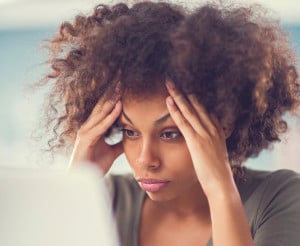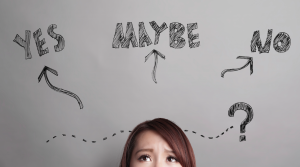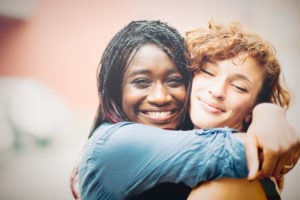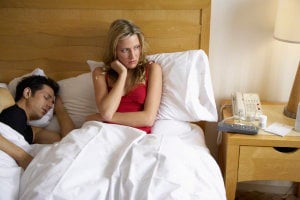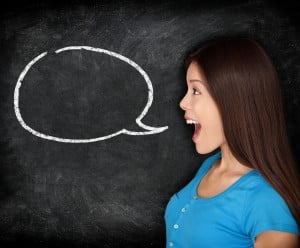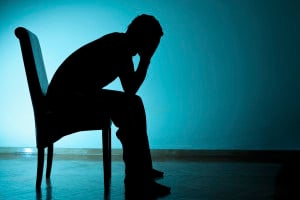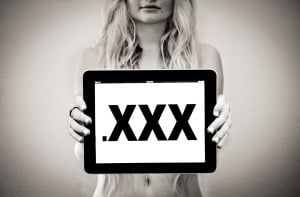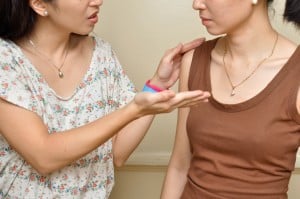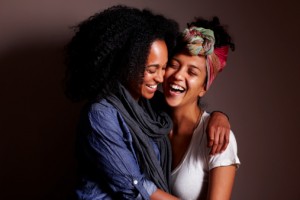
Source: Getty Images
As a woman, you may feel like the world is flooding your mental inbox with constant messages of how to think, feel, and behave.
And as a member of the LGBTQ+ community, it may seem as though everyone feels entitled to comment on your “lifestyle” as well.
People, regardless of gender or orientation, have some rigid ideas of how both women and gay people should go about their lives.
But let me tell you now: You don’t have to listen to a word of them.
Take back your power and pride as a woman and as a queer person by living your life by your own rules.
Honestly, I wish that someone had told me these five simple ideas to stand strong in both my female identity and my lesbian identity. I hope they help you feel empowered.
1. You Are Good Enough
Pop culture and outdated traditions constantly tell us that there is only one way to be a woman: transform into a skinny, smiling, chaste woman-child who aims to please.
This idea is intended to keep women small and obedient, which keeps men in ultimate power.
So take your power back by remaining true to yourself, even if others find it “Unladylike.”
Because the truth is: There is no right or wrong way to be a woman.
In the same vein, there is no right or wrong way to be a member of the LGBTQ+ community. Despite stereotypes and social trends, you will be accepted just for being yourself.
Straight people’s perceptions of the LGBTQ+ community are largely shaped by limited media and personal experiences, so simply by living openly, you will educate them.
If other LGBTQ+ people judge you because of your orientation, dating experiences, gender presentation, and so on, it does not mean that you are somehow a faulty gay person.
It means that they, unfortunately, are prejudiced.
And that’s on them, not you.
2. Pretty Does Not Equal Happy
The logic behind beauty and fashion advertising (as well as some advice you may receive) is as follows: Physical beauty will bring you romantic love, and love is the gateway to happiness.
That’s loaded with fallacies.
First of all, you are beautiful as you are. Really.
But not to mention, real love does not come from physical beauty anyway. If someone really loves you, your appearance is only part of the equation.
The cultural idea that marriage seals your “Happily Ever After” comes from the original traditions of marriage in which a man essentially buys a woman from her family and owns her while she raises his children.
Luckily, we aren’t living in those ages anymore. (Phew.)
You can be your vision of pretty if that’s what you want.
And you can be in a healthy relationship – but it isn’t the ticket to ultimate happiness.
You can even be single and happy about it.
It’s all about what you want.
But remember: When dating women in addition to being a woman, there is another person in your relationship influenced by the beauty-love-happiness logic. And it’s easy to forget that sometimes.
No matter how beautiful and strong you think your partner is, she may need the same support as you do.
In your own way, tell your partner that she is beautiful, you love her, and her worth is dictated by way more than her appearance.
3.Your Voice Matters
In many relationships and families, the husband or father figure acts as the voice of reason. This pattern extends into our culture’s stories and trickles down into our decisions and behaviors.
In our world, men are generally treated as ultimate authority figures.
Some women are afraid to push back on this tradition, perhaps because they don’t want to be perceived as incompetent, or worse, a “Bitch.” Unfortunately, there will be times when that will happen.
You should speak up anyway. The right people will listen.
If you use your voice, you have the potential to effect change. You may find like-minded individuals who have similar goals.
Also, most importantly, by using your voice, you can claim power over getting what you want and need without relying on anyone else’s permission or approval.
The LGBTQ+ community could use some more female voices, too.
It seems as though white, upper-class, thin, able-bodied gay cisgender men dominate gay spaces, from bars and clubs to media exposure to political involvement and beyond.
You can change that by getting involved and making your presence known.
Your experience as a gay woman differs greatly from the experience of a gay man, because of your intersection of oppressions. That is, women are treated as lesser beings in our society.
If you tell your stories, it will give others a more well-rounded perspective on the challenges that we all face as a community.
If you feel like gay spaces are “he-man-woman-hater-clubs,” you have every right to stand up for yourself or find a different space where you are included. And if that space doesn’t exist, you can make one.
4. Your Sex Life Is Your Business
Our culture has created an entire lexicon of words designed to tell women how much or little sex they should have: Prude, slut, tease, easy, skank, whore, sleaze, and so on.
When people use these words, they are implicitly gauging a woman’s worth based on what they perceive of that woman’s sex life.
But listen: Others do not have the right to peek into your little black book.
Nobody needs to know the number of partners you have had, and nobody has the right to judge you based on that number. Period.
There are many people who believe that promiscuity always leads to sexually transmitted diseases. I have heard this logic used in slumber-party gossip as well as sex education classes.
It is absolutely a scare tactic.
You should practice safe sex every time, get tested for sexually transmitted diseases and infections, and keep an open dialogue between yourself and your partner(s).
No shame. Just take care of yourself.
As an LGBTQ+ woman, you may experience the above judgments and more.
In addition to policing your amount of partners, there may be people who judge you for your sex life simply because you are part of the LGBTQ+ community.
Many lesbians are bombarded with extreme disrespect from men who feel emasculated by lesbians or entitled to any woman’s body.
Some men believe and express that gay women just need to have sex with “The Right Guy,” and they will somehow turn straight. (Eye roll.)
Genderqueer, trans*, gender-nonconforming, and queer women are often spoken of as sexual oddities, harassed, or even assaulted.
Regardless of your orientation or sexual experiences, you do not deserve to be treated as an inferior person.5. You cannot please everyone, and that’s okay.
Women are taught to be nurturing and obedient because we are often forced into the roles of child-bearer and wife.
When we experience social rejection, we may blame ourselves because of the expectation to take care of others’ needs before our own.
There are always going to be people who dislike you.
That does not mean you have failed.
People may be jealous or judgmental, and that has nothing to do with you.
You can’t fix others’ opinions.
Let go. Others will love you. I guarantee it.
In the midst of the civil rights movement for the LGBTQ+ community, it is important to remember this lesson in another context: There are always going to be homophobic people, and you cannot make them accept you.
Homophobia, by definition, is rooted in fear.
This fear usually comes from beliefs or insecurities far more powerful than one person.
Some brave people can overcome their fear, but it takes time and patience.
No amount of activism, academia, or love will change a prejudiced person set in their ways. Please know that there are people who will unconditionally embrace you.
The ignorant few who cannot face their fears are the ones missing out.
—
Despite the pressures you may face, it is not your job to appease everyone with your exterior beauty, silence, or sexuality.
All you can ever do is be yourself and try not to hurt others.
It takes courage to stand up to outdated, sexist, and discriminatory traditions. You may not always succeed, but it is important that you try.
You have worth. You have power. You are not alone.
Want to discuss this further? Login to our online forum and start a post! If you’re not already registered as a forum user, please register first here.
Maddie McClouskey is a twenty-something lesbian in New York City. She currently writes weekly dating advice pieces for the LGBTQ event app and website SheSeekOnline and was a regular contributor to the sexuality and feminism site, ToughxCookies. When she’s not writing articles about gayness, she’s performing stand-up comedy, singing show tunes to her girlfriend and dog against their will, or making up jokes for Twitter @SoundofMaddie.
Search our 3000+ articles!
Read our articles about:
Our online racial justice training
Used by hundreds of universities, non-profits, and businesses.
Click to learn more
Most Read Articles
- « Previous
- 1
- …
- 30
- 31
- 32





